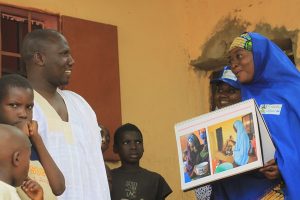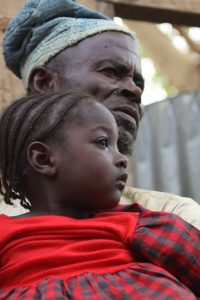Aisha and her grandfather

SOKOTO (Nigeria)– “We never felt the need to get our children immunized, but now, I will do my best to mobilize our community,” says Muhammad Bello, the grandfather of a 2-year-old Aisha who fell victim to the wild poliovirus just a few weeks ago in Sokoto state, northern Nigeria.
Aisha is now amongst the 30 children in northern Nigeria who have as of May been infected by the wild poliovirus. “I do not really understand what happened. Aisha felt sick for weeks and got a high fever. Her legs have now started to get very weak and she has a hard time trying to stand up. The doctor said it was too late, she may get polio, but we need to confirm,” says Aisha’s mother Zainabu. Aisha’s case was confirmed a few weeks later.
“In the past, we always refused vaccination because some of our neighbours told the oral polio vaccine can cause sterility. Now, we know that it is not true and we can see the consequences. From now on, I will commit myself to be part of the social mobilization team,” says teary-eyed Zainabu holding little Aisha in her arms.
Sokoto is one of the most high risk states in Nigeria with persistent circulation of the wild poliovirus. Already five new cases of wild poliovirus have been reported in the State in 2012. “I am seriously concerned about the situation of polio in Sokoto, in particular, because we still keep missing lots of children during campaigns and some parents still refuse to immunize their children,” says Garba Kadi, Director of the Primary Health Care Agency of Sokoto State.

Muhammad Bello
UNICEF/ Andriamasinoro
In Sokoto, the proportion of missed children has shown an increasing trend over the last three campaigns, from 6.7% in December 2011 to 7.3% in March 2012. Non-compliance (refusals) as a reason for missed children remains high, around 30% in the March round, and one quarter (24%) of all the refusals remain unresolved in the State.
Alh. Aliyu Magatakarda Wamakko, the State Governor himself, during the flag-off ceremony of the May Immunization Plus Days (Immunization Campaign from 19 to 22 May), instructed all the local government stakeholders to rise up to the task of eradicating polio from the State. “I urge all local government chairmen to personally monitor the situation in their respective areas and address the challenges related to refusals and missed children. I do not want to see any new cases.”
UNICEF, as part of its support to the polio eradication program, has deployed a team of community mobilizers to address the issues of missed children and refusals to polio immunization programmes. A total of 200 volunteer community mobilizers have been deployed in the State covering the eight most high-risk local governments of Sokoto.
As of May 2012, Nigeria has recorded 30 cases of wild poliovirus compared to 15 cases for the same period in 2011. Some polio-free States like Kaduna and Niger have been re-infected in 2012. In key infected states, like Sokoto, more than one in three children has received less than four doses of oral polio vaccine. More than fifty per cent of this year’s cases worldwide are from Nigeria.
“It is too late for us, but not for others. Tell our story and spread the word. Refusing polio immunization can harm your child’s future,” concludes Muhammad Bello, “I can promise you, I will do my best to offer a brighter future to Aisha. I owe her that much.”
Read the Polio-free Nigeria site for more on the campaign against polio in Nigeria.



